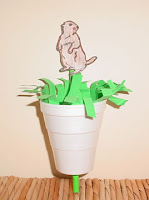As teachers, we really
are brain engineers, and
we need to know as much as we can about the brain. Eric
Jensen has always been my “go to” source for brain research. I read TEACHING WITH THE BRAIN IN MIND
over ten years ago, but I recently reread the second edition and was struck by
the “dissonance” (loved how this word was used in the book) between research
and practice. Research on
children’s brains continually emphasizes the importance of movement,
multi-sensory experiences, emotions, environmental factors, language, etc. in
learning. Classroom practice is a
far cry from what we SHOULD be doing and what we know is BEST for children!
Knowledge is
power! I know how busy you are, so
here are some of my favorite highlights from the book. Children are fascinated by their
brains, so explain the research to them when you experiment and try new
things. “Boys and girls, I found
out from the brain research that we need to move more to get blood going to our
brains. Let’s give it a try today
and see what happens!” “Your brain
is like a sponge and needs lots of water.
Everybody bring a water bottle to school and let’s ‘hydrate’ our brains
more often.”
Vary
Instruction
In K-2 classrooms
children can handle 5-8 minutes of direct instruction.
Change your voice,
change location, use a prop, divide children into small groups, use choral
response, etc.
Use movement to
activate attention. Stand, go for
a walk, stretch, dance, march, or sing.
Balance active
learning with passive learning.
Movement
Movement can
strengthen learning, improve memory, and enhance motivation and morale. Movement can also enhance social skills
and reduce stress.
Exercise fuels the
brain with oxygen and increases the number of connections between neurons. (Rats grow more brain cells when they
exercise! Hmmm! Why are we taking away recess and PE?)
Play
Play is good for
us and for our brains!
Exercise play
(running, dance, routines)
Group games
(basketball, soccer)
Outdoor
explorations (digging, climbing)
Solitary play
(puzzles, beads)
Stand and stretch
(Simon Says)
Constructive
(blocks)
Dance and drama
Walks and hikes
Point to (touch
something that starts with /m/, point to a proper noun)
Music, Music,
Music!
Singing is an
engaging and convenient way to learn.
Music acts as a place holder in the brain and is good for repetition.
Language
Children need to
talk as they learn and they need to talk about what they have learned. DEATH IS SILENT. LEARNING IS NOISY!
Invite children to
discuss what they have learned and recall information with a partner.
Encourage parents
to talk to their child daily about school events and what they are learning.
Questions
Ask open-ended
questions and give children time to think.
Encourage children
to “think out loud” by asking, “How did you know that?”
Cross Lateral
Movements
Crossing the
midline helps blood flow to both hemispheres.
*Simple Tap - Touch right hand to left knee
and left hand to right knee.
*Bend and Stretch - Lift left knee and
touch with right elbow. Lift right
knee and touch with left elbow.
*Backwards Touch - Lift left foot behind
you and stretch back with right hand and touch. Reverse for the right foot and left hand.
*Nose and Ears – Touch right ear with left
hand and place right hand on your nose.
Touch left ear with right hand and place left hand on your nose.
*Disco Dance – Put right index finger in
the air and point to the left.
Bring right index finger down by your side. Place left index finger in the air and point to the right. Then bring down by your side.
*Crazy Eights – Make the figure eight in
front of you with your right hand and then your left hand. Make “lazy” eights by making
eight laying down with your right hand.
Make lazy eights with your left hand.
Clasp your right and left hand and make
large lazy eights.
Lean over and pretend to draw an imaginary
“lazy” eight on the floor with your right hand and then your left hand.
*Brain Hug – Stretch out arms, cross right
over left, clasp fingers, bring down and toward your chest and squeeze your
arms.
Personal
Processing
Children need time
to digest new information and reflect on what they have learned. Just call the rest period after lunch
“brain growth” time.























